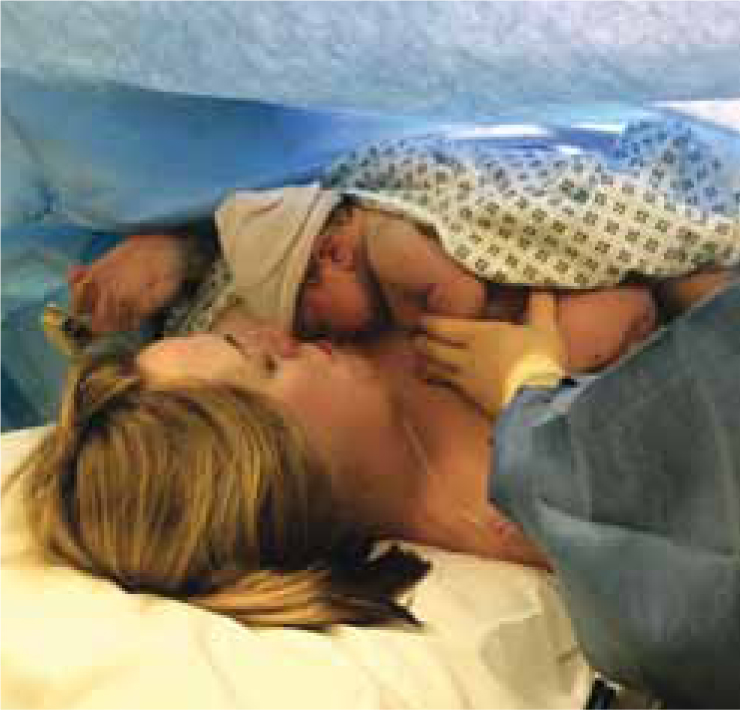‘You're going to be a pioneer, aren't you?’ said my vaginal birth after caesarean (VBAC) midwife, Jo, at a clinic appointment when I was 36 weeks pregnant with my second baby.
She was talking about the ‘back-up’ caesarean birth plan that I had written based on a paper entitled ‘The natural caesarean: a woman-centred technique’ (Smith et al, 2008), where the birth is slow, actively involves the parents, allows immediate extended skin-to-skin in theatre and delays the clamping of the cord.
Jo cautioned me that she didn't know how open to this approach her colleagues would be—and it turned out she was right. At both my clinic appointment with a registrar and a subsequent appointment with a Supervisor of Midwives and the Clinical Lead for Obstetrics, I was told: ‘We don't do “natural caesareans” in this Trust.’ They said they could not arrange this as it takes around a year to agree new protocols that require multidisciplinary input.
As I primarily wanted a VBAC in water on the co-located midwife-led unit (which Jo had supported), I decided not to challenge further or research different hospitals. Rather, I opted to wait as long as possible for spontaneous labour and resist scheduling a caesarean birth.
Sadly, my VBAC was not meant to be, and I ended up in theatre under similar circumstances to my first birth. But this time, my midwife knew I had a caesarean birth plan and advocated for me in theatre. I was able to have almost immediate, extended skin-to-skin (after they cleared my son's airways of meconium), the drape was lowered and they reminded my husband to take photos as my son was born.
It was so much better than my first birth, despite the fact that the clinical circumstances were almost identical. This drove home to me that all births can be improved, even stressful emergency caesareans, and that midwives can play a critical role in advocating for the mother.

Becoming a pioneer
In the weeks and months following my second birth, I became very busy with my two young children. But Jo's question—‘You're a going to be a pioneer, aren't you?’—continued to play on my mind.
I wanted to raise awareness of the choices women can make surrounding caesarean birth—knowing that, for many women, if you don't know your choices, then you don't have any. I also wanted to help make woman-centred approaches to caesarean birth the norm in the NHS, as this could help make women's negotiations less stressful at an individual level.
However, I also knew, from my time as a maternity commissioner and charity manager prior to having children, that achieving change in the NHS can be a real challenge unless it has senior buy-in. I was at a loss about how to take my passion for change forward.
When my son was around 6 months old, I met for coffee with a couple of former colleagues, who drew my attention to the #MatExp and #TheEdgeNHS social media campaigns. These were exactly what I was looking for: focusing on an emerging new model for achieving change in the NHS that acknowledges that everyone in the system can help tackle the most challenging issues (including front-line staff and service users). Inspired by these new approaches to achieving change, Caesarean in Focus is creating space to specifically talk about caesareans: why they happen; how they happen; to whom they happen; how they impact women and families; and how we can improve the outcomes of caesarean section (across NHS themes of experience, efficacy and safety). Our aim is to involve all interested parties in developing solutions that are embraced across the system rather than imposed.
Our Facebook group currently has 130 members including midwives, obstetricians, anaesthetists, doulas, researchers and families. We are really keen that anyone with an interest in caesarean birth gets involved, particularly those working clinically as they are not often brought into strategic ‘choice’ debates or guideline development.
Thousands of conversations about caesareans happen every day on social media, in antenatal classes, in the media, in midwife appointments, in operating theatres and in many other places. We are bringing together diverse voices in a change conversation that specifically focuses on how families experience caesarean birth and what choices may be available to them, so that we can ultimately change the conversations that shape everyday thinking and actions of clinicians and families.
Please come and join us: our platform is missing your voice!
Caesarean in Focus can be found at www.facebook.com/groups/caesareaninfocus

